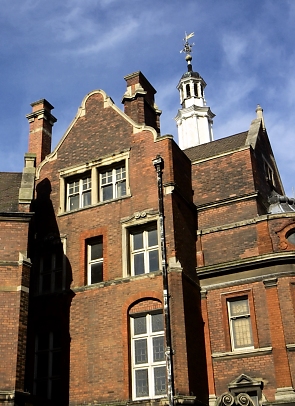A very indistinct area situated north of the City
of London. First recorded in the 13th century, the manor covered a swathe of the boggy moor that lay beyond the City wall.
By the 15th century a manor house stood at what is now the corner of Finsbury Pavement and Chiswell Street. Houses and places
of entertainment were built as the marshes were drained. James Burbage’s Curtain theatre in Shoreditch was described
as being ‘in Finsbury Fields’. Finsbury Square and Finsbury Circus were laid out in the late 18th and early 19th
centuries as the nuclei of a high-class suburb that never achieved its full potential and subsequently converted to commercial
use. Finsbury was a parliamentary constituency in the 19th century and in 1901 the metropolitan borough of Finsbury was formed
from the southern Clerkenwell parishes of St James and St John. Many of the borough’s civic and public buildings lay in the vicinity of Rosebery
Avenue, and Finsbury’s name thus came to be primarily associated with this neighbourhood. The borough took over Clerkenwell’s
stately Flemish Renaissance vestry hall as its headquarters. The council developed a ‘Finsbury plan’ to improve
living conditions in this overcrowded area and its most notable success was Berthold Lubetkin’s Finsbury health centre
of 1938. In its present state this is by no means a beautiful building but it has been grade I listed for its significance
to the modernist architectural movement and there are plans for it to be reinstated to something like its former glory. The
Borough of Finsbury was merged into Islington in 1965 and has begun to fade from recognition. Clerkenwell estate agents still
refer to properties in the Rosebery Avenue area as being ‘in the heart of Finsbury’ but most outsiders now associate
the name with the park that was created for the constituency’s residents three miles to the north. After a long period
of dereliction Finsbury town hall has recently been restored as a dance centre for the Urdang Academy.
The Finsbury
constituency, once one of the largest in Britain, was traditionally a focus for political progressiveness. Charles Babbage,
who invented the forerunner of the computer, addressed the political implications of mechanization in his Finsbury election
campaign of 1832, while Thomas Wakley led demands for the extension of the franchise, the repeal of the Corn Laws and the
abolition of slavery.
|
 |
|
|
|
 |

|
| The former Finsbury town hall, now a dance academy, with rooms available for hire |
In 1892 Dadabhai Naoroji became Britain’s first Asian MP as the Liberal member for Finsbury. Naoroji has been called
‘grand old man of India’ because of his later work as president of the Indian National Congress in its formative
years. Vladimir Lenin lived in Finsbury during his exile from Russia in the early years of the 20th century.
|
 |
|
|
|

